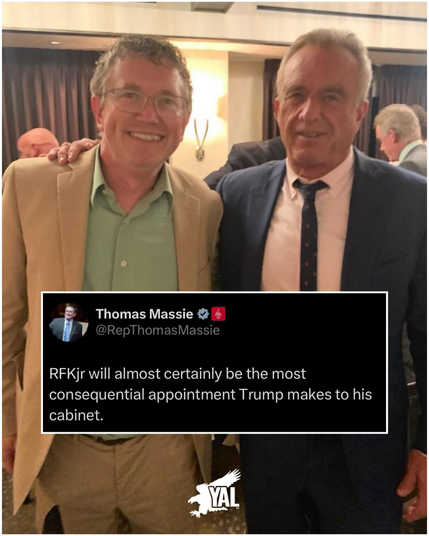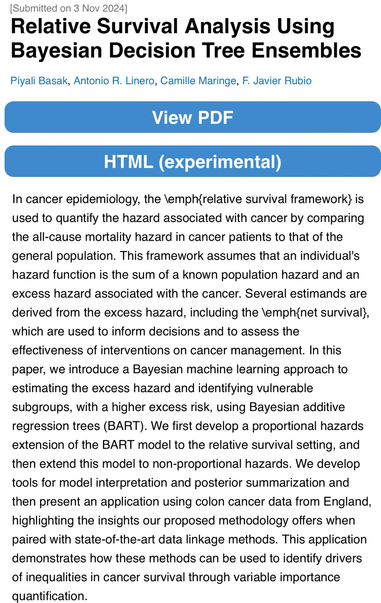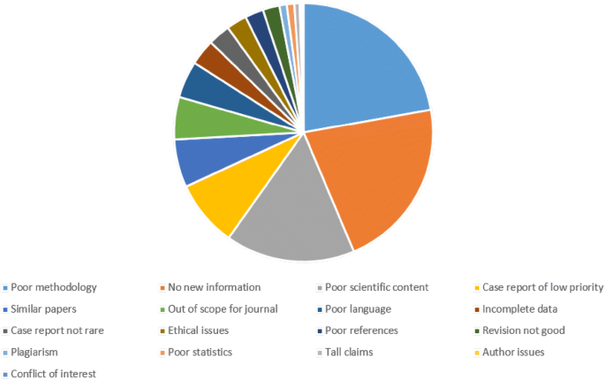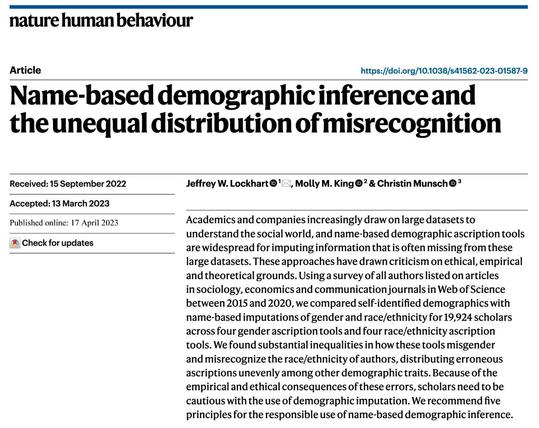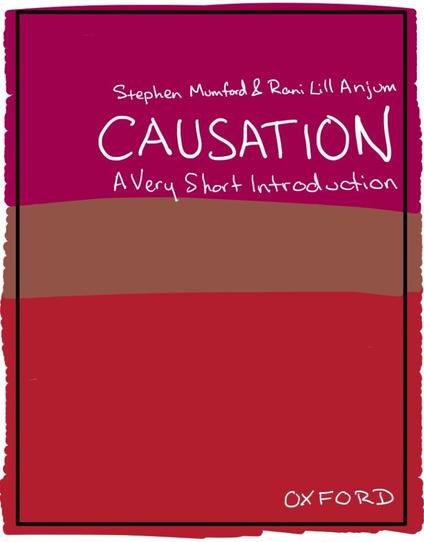Well, I don't disagree #epitwitter
#epitwitter
RT by @ECDC_EU: Big news
#WHO ánd #ECDC joined BlueSky! 🦋
🌍 World Health Organization @WHO
https://bsky.app/profile/who-global.bsky.social
🇪🇺 European Centre for Disease Prevention and Control @ECDC_EU
https://bsky.app/profile/ecdc-eu.bsky.social
#EpiTwitter #EpiSky #SoMe4epi
😷🩺🧪🦠 🛟
[2024-11-20 08:32 UTC]
New preprint with P. Basak, A. Linero, and C. Maringe
"Relative Survival Analysis Using Bayesian Decision Tree Ensembles"
#EpiTwitter: Public Health Messaging During the COVID-19 Pandemic
Ashwin Rao, Nazanin Sabri, Siyi Guo, Louiqa Raschid, Kristina Lerman
https://arxiv.org/abs/2406.01866 https://arxiv.org/pdf/2406.01866
arXiv:2406.01866v1 Announce Type: new
Abstract: Effective communication during health crises is critical, with social media serving as a key platform for public health experts (PHEs) to engage with the public. However, it also amplifies pseudo-experts promoting contrarian views. Despite its importance, the role of emotional and moral language in PHEs' communication during COVID-19 remains under explored. This study examines how PHEs and pseudo-experts communicated on Twitter during the pandemic, focusing on emotional and moral language and their engagement with political elites. Analyzing tweets from 489 PHEs and 356 pseudo-experts from January 2020 to January 2021, alongside public responses, we identified key priorities and differences in messaging strategy. PHEs prioritize masking, healthcare, education, and vaccines, using positive emotional language like optimism. In contrast, pseudo-experts discuss therapeutics and lockdowns more frequently, employing negative emotions like pessimism and disgust. Negative emotional and moral language tends to drive engagement, but positive language from PHEs fosters positivity in public responses. PHEs exhibit liberal partisanship, expressing more positivity towards liberals and negativity towards conservative elites, while pseudo-experts show conservative partisanship. These findings shed light on the polarization of COVID-19 discourse and underscore the importance of strategic use of emotional and moral language by experts to mitigate polarization and enhance public trust.
Das Dengue-Virus heißt so, weil man mal dachte es handelte sich bei einem durch das Virus verursachten Ausbruch um einen "plötzlichen Anfall durch einen Geist" (in Suaheli: Ki denga pepo).
Any book or article suggestions on screening (cancer or other diseases)?
Looking for something (pref. intermediate level) that covers pros, cons, potential biases, and/or design strategies, if possible
RT by @ECDC_EU: Amazing presentation by Ines Steffens, Editor-in-cief of @Eurosurveillanc to end the day at @ECDC_EU @ESCMID talking about diamond #openaccess, responsible use of #AI, and many other exciting topics related to #science!
#PublicHealth #EpiTwitter
🐦🔗: https://nitter.cz/yassentch/status/1714674134515413027#m
[2023-10-18 16:05 UTC]
Hi #epitwitter #epiverse #malaria community: in drug treatment, we accept that combination therapy is a good way to prevent drug-resistance emergence. And that #tripletherapy is likely to be more preventative than #doubletherapy. 1/
Hey demography/epi friends:
What are your favorite measures of the intensity of mortality in one group or the difference/change in mortality across multiple groups or over time?
Got any cutting-edge innovations (there are a bunch!) or forgotten favorites? I’m compiling a list. I’ve got tons but I want yours!
#demography #epi #EpiTwitter #PopStudies #mortality #longevity #MortalityDisparities #lifespan
Hi #epitwitter #epiverse #influenza mastodon, when does influenza transmission occur in the tropics where there’s no winter to concentrate all respiratory virus transmission into a single short season? There has been a lot of focus on this question for the past 15 years. 1/
SurvLT: Calculating survival probabilities from a Life Table
The following R code presents an illustrative example on the calculation of the survival probabilities of a set of individuals based on life tables.
Any users of the Cochrane ROB2 Excel template (for cRCTs) willing to help me troubleshoot a technical glitch? (Related to the .xlsm file itself) lmk + I'd be grateful! #epitwitter
Honored to work with Dr. MAIHDA, @clarerevans42 is the best! I and Drs. Nieves, @HeidiJones_Epi and Huynh look forward to continue collaborating.
#SDoH #socialepi #medicalsociology #AcademicTwitter #epiverse #epitwitter
---
RT @clarerevans42
Excited to share our study on
intersectional inequities in birthweight using intersectional multilevel modeling (MAIHDA)
#socialdeterminants #socialepi #medicalsociology #AcademicTwitter
Ha…
https://twitter.com/clarerevans42/status/1652042863130316800
#Publication, #PeerReview & Rejections: "Interestingly, it is reported that 62% of papers have been rejected at least once by other journals before getting published." #journal #editor #academia #AcademicTwitter #AcademicChatter #epitwitter #epiverse
---
RT @Sunitasriv
Why our papers get rejected👇 #PhD #PhDposition #phdlife #research #scientists #Science
@PhDVoice
Source : "Rejection Blues: Why Do Research Papers Get Rejected?" by Suva…
https://twitter.com/Sunitasriv/status/1650733329358921728
The Nelson-Aalen estimator is a non-parametric estimator of the cumulative hazard function. The following R code shows how to calculate the Nelson-Aalen estimator for a sample of times to event.
https://rpubs.com/FJRubio/NelsonAalen
#teaching #survival #hazard #epitwitter #rstats
source files can be found at: https://github.com/FJRubio67/SurvivalTools
Very interesting piece on CIs. #academia #AcademicChatter #epitwitter #epiverse
---
RT @DataSciFact
Confidence intervals are better in practice than in theory.
https://www.johndcook.com/blog/2023/04/23/confidence-interval/
https://twitter.com/DataSciFact/status/1650200080274583553
Interesting thread on #AI & #research: “We found substantial inequalities in how these tools misgender & misrecognize the race/ethnicity of authors, distributing erroneous ascriptions unevenly among other demographic traits.” #academia #AcademicChatter #epitwitter #epiverse
---
RT @jw_lockhart
Ahh congratulations to my coauthors!! It's publication day for our new @NatureHumBehav article!
Our work has big implications for anyone imputi…
https://twitter.com/jw_lockhart/status/1647997688028471296
PSA loud and clear for the people in the back! #academia #AcademicChatter #AcademicTwitter #epitwitter #epiverse
---
RT @DrMonicaCox
This is how you know who is valued in your organization.
Whose stories are believed?
Whose complaints are responded to?
Who is paid the most?
Who is given multiple chances?
Whose bad behaviors are not addressed?
Who benefits from organizational policies?
https://twitter.com/DrMonicaCox/status/1646886056724254721
Sad but true: Bullying is tool used in #academia by mediocre people to get to the top. Even worst when institutions allow these behaviors. #AcademicChatter #epitwitter #epiverse #AcademicTwitter https://www.nature.com/articles/s41562-022-01311-z
---
RT @DrMonicaCox
Sometimes I wonder if the people I meet in higher ed were the ones beating other kids up on the playground or cheating on tests, because why are their so many thugs here?
…
https://twitter.com/DrMonicaCox/status/1646125575529021440
Excellent thread on #causation #causalinference #epitwitter #epiverse #AcademicChatter #AcademicTwitter
---
RT @EpiEllie
Interested in thinking more deeply about what a “cause” is? Causation: A Very Short Introduction from @ranilillanjum and @SDMumford is a great starting point.
Thread recap starting now👇🏽#twittereview #epibookclub #causation #causalinference #epimethodsclub
https://twitter.com/EpiEllie/status/1041369701996265474
